 | TODAY IN SCIENCE HISTORY
NEWSLETTER - 6 JULY |
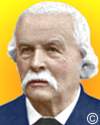 On 6 July 1817, Rudolph von K�lliker was born, one of the founders of embryology. With pioneering microscopic work on tissues, he identified the cell structure of tissues, that nerve fibres are elongated cells, and the cellular form of the egg and sperm. He also suspected that the cell nucleus was involved in heredity, but it was for others who came later to unravel that mystery. For much more background, read his obituary in the British Medical Journal, Rudolph Albert von K�lliker from 1905. On 6 July 1817, Rudolph von K�lliker was born, one of the founders of embryology. With pioneering microscopic work on tissues, he identified the cell structure of tissues, that nerve fibres are elongated cells, and the cellular form of the egg and sperm. He also suspected that the cell nucleus was involved in heredity, but it was for others who came later to unravel that mystery. For much more background, read his obituary in the British Medical Journal, Rudolph Albert von K�lliker from 1905. |
 On 6 Jul 1885, French scientist Louis Pasteur and his colleagues began a series of injections to save a 9-year-old boy from a dreaded disease. Pasteur, a French chemist and a founder of microbiology, prepared important vaccines for several diseases. Today's Science Store pick is The Private Science of Louis Pasteur, by Gerald L. Geison, a Princeton University history professor. In giving Pasteur the close scrutiny his achievements and their darker sides deserve, Geison's book offers compelling reading for anyone interested in the social and ethical dimensions of science. Geison presents this unadorned truth after careful research from scrutinizing Pasteur's private papers and laboratory notebooks, available only in recent years. This biography considers the complexities of science as it is actually created, instead of merely clinging to comforting and heroic myths. On 6 Jul 1885, French scientist Louis Pasteur and his colleagues began a series of injections to save a 9-year-old boy from a dreaded disease. Pasteur, a French chemist and a founder of microbiology, prepared important vaccines for several diseases. Today's Science Store pick is The Private Science of Louis Pasteur, by Gerald L. Geison, a Princeton University history professor. In giving Pasteur the close scrutiny his achievements and their darker sides deserve, Geison's book offers compelling reading for anyone interested in the social and ethical dimensions of science. Geison presents this unadorned truth after careful research from scrutinizing Pasteur's private papers and laboratory notebooks, available only in recent years. This biography considers the complexities of science as it is actually created, instead of merely clinging to comforting and heroic myths.
 To make your own choice of book on Louis Pasteur, see this Book List. To make your own choice of book on Louis Pasteur, see this Book List. For picks from earlier newsletters, see the Today in Science Science Store home page. | |

| "I am among those who think that science has great beauty. A scientist in his laboratory is not only a technician: he is also a child placed before natural phenomena which impress him like a fairy tale. We should not allow it to be believed that all scientific progress can be reduced to mechanisms, machines, gearings, even though such machinery has its own beauty." - Antoine de Jussieu, physician and botanist (born 6 Jul 1686)  |
| "Nature becomes fertile only by virtue of laws that oblige matter to organize itself into one of a number of necessarily very simple primitive forms. Because of their very simplicity, these are capable of constituting the basis for increasingly complex bodies, by the addition of organs calculated according to identical laws of possibility." - Jean-Baptiste Georges Marie Bory de Saint-Vincent, French biologist (born 6 Jul 1778)  |
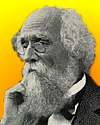 | "There is nothing which Nature so clearly reveals, and upon which science so strongly insists, as the universal reign of law, absolute, universal, invariable law... Not one jot or tittle of the laws of Nature are unfulfilled. I do not believe it is possible to state this fact too strongly... Everything happens according to law, and, since law is the expression of Divine will, everything happens according to Divine will, i.e. is in some sense ordained, decreed." - Joseph LeConte, American geologist (born 6 Jul 1823)  |
| Before you look at today's web page, see if you can answer some of these questions about the events that happened on this day. Some of the names are very familiar. Others will likely stump you. Tickle your curiosity with these questions, then check your answers on today's web page. |
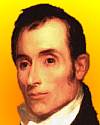
|  Alexander Wilson, born 6 Jul 1766, was a Scottish-born American naturalist and poet whose pioneering work in 9 volumes, (1808-14), established him as a one of the foremost naturalists of his time Alexander Wilson, born 6 Jul 1766, was a Scottish-born American naturalist and poet whose pioneering work in 9 volumes, (1808-14), established him as a one of the foremost naturalists of his time
 What was the subject of his 9 volume work which made him one of the founders in this field? |
 |  Antoine de Jussieu, born 6 Jul 1686, was a physician and botanist who wrote many papers on human anatomy, zoology, and botany, including one on the flower and fruit of the coffee shrub. Antoine de Jussieu, born 6 Jul 1686, was a physician and botanist who wrote many papers on human anatomy, zoology, and botany, including one on the flower and fruit of the coffee shrub.
 What was this botanist's nationality? |
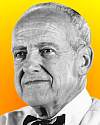
|  Nathaniel Wyeth (1911-1990) was a US chemist and inventor, brother of distinguished American painter Andrew Wyeth. In 1973, a patent was issued to him for a beverage bottle plastic that was the first plastic strong enough to hold highly pressurized carbonated beverages without bursting. Nathaniel Wyeth (1911-1990) was a US chemist and inventor, brother of distinguished American painter Andrew Wyeth. In 1973, a patent was issued to him for a beverage bottle plastic that was the first plastic strong enough to hold highly pressurized carbonated beverages without bursting.
 What is the common name of this plastic? What is the common name of this plastic? |
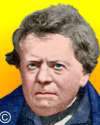
|  A German physicist (1789-1854) showed by experiment (1825) that there are no "perfect" electrical conductors. He stated "If the given temperature remains constant, the current flowing through certain conductors is proportional to the potential difference (voltage) across it." A German physicist (1789-1854) showed by experiment (1825) that there are no "perfect" electrical conductors. He stated "If the given temperature remains constant, the current flowing through certain conductors is proportional to the potential difference (voltage) across it."  Can you name this scientist? Can you name this scientist? |
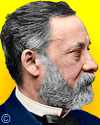 |  On 6 Jul 1885, French scientist Louis Pasteur and his colleagues injected the first of 14 daily doses of rabbit spinal cord suspensions containing a progressively inactivated virus into 9-year-old Joseph Meister who was at risk for a certain infection. The immunization was successful. The boy grew up and became caretaker at the Pasteur Institute. On 6 Jul 1885, French scientist Louis Pasteur and his colleagues injected the first of 14 daily doses of rabbit spinal cord suspensions containing a progressively inactivated virus into 9-year-old Joseph Meister who was at risk for a certain infection. The immunization was successful. The boy grew up and became caretaker at the Pasteur Institute.
 The vaccination was designed for protection against which virus? |
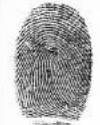 |  On 6 Jul of a certain year, John Walker's fingerprints were the first ones to be exchanged by police officials in Europe and America. Law enforcement units in London and St. Louis, MO. completed the exchange. On 6 Jul of a certain year, John Walker's fingerprints were the first ones to be exchanged by police officials in Europe and America. Law enforcement units in London and St. Louis, MO. completed the exchange.
 In what decade did this international exchange of fingerprints take place? |
|  On 6 Jul of a certain year, the last London tram ceased operation. Large crowds witnessed it. They began in the early 1900's, but had come to be regarded as too noisy and dangerous. They were replaced with electric trolleybuses which needed no tracks. On 6 Jul of a certain year, the last London tram ceased operation. Large crowds witnessed it. They began in the early 1900's, but had come to be regarded as too noisy and dangerous. They were replaced with electric trolleybuses which needed no tracks.
 In what decade did this last London tram make its last trip? |
When you have your answers ready to all the questions above, you'll find all the information to check them, and more, on the July 6 web page of Today in Science History. Or, try this link first for just the brief answers.
Fast answers for the previous newsletter for July 5: Robert Fitzroy; the dating and interpreting of past events by the analysis of tree rings; platinum; Scotland.
|
 If you enjoy this newsletter, the website, or wish to offer encouragement or ideas, please send feedback by using your mail reader Reply button. If you enjoy this newsletter, the website, or wish to offer encouragement or ideas, please send feedback by using your mail reader Reply button. |
--
If you do not want to receive any more newsletters,
Unsubscribe To update your preferences and to unsubscribe visit
this link 


 On 6 July 1817, Rudolph von K�lliker was born, one of the founders of embryology. With pioneering microscopic work on tissues, he identified the cell structure of tissues, that nerve fibres are elongated cells, and the cellular form of the egg and sperm. He also suspected that the cell nucleus was involved in heredity, but it was for others who came later to unravel that mystery. For much more background, read his obituary in the British Medical Journal, Rudolph Albert von K�lliker from 1905.
On 6 July 1817, Rudolph von K�lliker was born, one of the founders of embryology. With pioneering microscopic work on tissues, he identified the cell structure of tissues, that nerve fibres are elongated cells, and the cellular form of the egg and sperm. He also suspected that the cell nucleus was involved in heredity, but it was for others who came later to unravel that mystery. For much more background, read his obituary in the British Medical Journal, Rudolph Albert von K�lliker from 1905.


 Alexander Wilson, born 6 Jul 1766, was a Scottish-born American naturalist and poet whose pioneering work in 9 volumes, (1808-14), established him as a one of the foremost naturalists of his time
Alexander Wilson, born 6 Jul 1766, was a Scottish-born American naturalist and poet whose pioneering work in 9 volumes, (1808-14), established him as a one of the foremost naturalists of his time What was the subject of his 9 volume work which made him one of the founders in this field?
What was the subject of his 9 volume work which made him one of the founders in this field?
 Antoine de Jussieu, born 6 Jul 1686, was a physician and botanist who wrote many papers on human anatomy, zoology, and botany, including one on the flower and fruit of the coffee shrub.
Antoine de Jussieu, born 6 Jul 1686, was a physician and botanist who wrote many papers on human anatomy, zoology, and botany, including one on the flower and fruit of the coffee shrub. What was this botanist's nationality?
What was this botanist's nationality?
 Nathaniel Wyeth (1911-1990) was a US chemist and inventor, brother of distinguished American painter Andrew Wyeth. In 1973, a patent was issued to him for a beverage bottle plastic that was the first plastic strong enough to hold highly pressurized carbonated beverages without bursting.
Nathaniel Wyeth (1911-1990) was a US chemist and inventor, brother of distinguished American painter Andrew Wyeth. In 1973, a patent was issued to him for a beverage bottle plastic that was the first plastic strong enough to hold highly pressurized carbonated beverages without bursting. What is the common name of this plastic?
What is the common name of this plastic? 
 A German physicist (1789-1854) showed by experiment (1825) that there are no "perfect" electrical conductors. He stated "If the given temperature remains constant, the current flowing through certain conductors is proportional to the potential difference (voltage) across it."
A German physicist (1789-1854) showed by experiment (1825) that there are no "perfect" electrical conductors. He stated "If the given temperature remains constant, the current flowing through certain conductors is proportional to the potential difference (voltage) across it."  Can you name this scientist?
Can you name this scientist? 
 On 6 Jul 1885, French scientist Louis Pasteur and his colleagues injected the first of 14 daily doses of rabbit spinal cord suspensions containing a progressively inactivated virus into 9-year-old Joseph Meister who was at risk for a certain infection. The immunization was successful. The boy grew up and became caretaker at the Pasteur Institute.
On 6 Jul 1885, French scientist Louis Pasteur and his colleagues injected the first of 14 daily doses of rabbit spinal cord suspensions containing a progressively inactivated virus into 9-year-old Joseph Meister who was at risk for a certain infection. The immunization was successful. The boy grew up and became caretaker at the Pasteur Institute. The vaccination was designed for protection against which virus?
The vaccination was designed for protection against which virus?
 On 6 Jul of a certain year, John Walker's fingerprints were the first ones to be exchanged by police officials in Europe and America. Law enforcement units in London and St. Louis, MO. completed the exchange.
On 6 Jul of a certain year, John Walker's fingerprints were the first ones to be exchanged by police officials in Europe and America. Law enforcement units in London and St. Louis, MO. completed the exchange. In what decade did this international exchange of fingerprints take place?
In what decade did this international exchange of fingerprints take place? On 6 Jul of a certain year, the last London tram ceased operation. Large crowds witnessed it. They began in the early 1900's, but had come to be regarded as too noisy and dangerous. They were replaced with electric trolleybuses which needed no tracks.
On 6 Jul of a certain year, the last London tram ceased operation. Large crowds witnessed it. They began in the early 1900's, but had come to be regarded as too noisy and dangerous. They were replaced with electric trolleybuses which needed no tracks. In what decade did this last London tram make its last trip?
In what decade did this last London tram make its last trip? If you enjoy this newsletter, the website, or wish to offer encouragement or ideas, please send feedback by using your mail reader Reply button.
If you enjoy this newsletter, the website, or wish to offer encouragement or ideas, please send feedback by using your mail reader Reply button. 

Δεν υπάρχουν σχόλια:
Δημοσίευση σχολίου